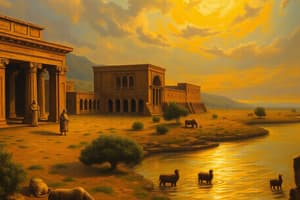Podcast
Questions and Answers
Where was Mesopotamia, and what does the name mean?
Where was Mesopotamia, and what does the name mean?
Mesopotamia means 'between rivers' in Greek. It lies between the Tigris and Euphrates rivers and between Asia Minor and the Persian Gulf.
The world's first civilizations were in the valleys of which rivers?
The world's first civilizations were in the valleys of which rivers?
The Tigris and Euphrates
What supported the growth of civilization?
What supported the growth of civilization?
The rivers of Southwest Asia, most specifically the Tigris and the Euphrates
What is the Fertile Crescent?
What is the Fertile Crescent?
What made civilization possible in Mesopotamia?
What made civilization possible in Mesopotamia?
Food production in Mesopotamia led to what?
Food production in Mesopotamia led to what?
The early Mesopotamians developed irrigation for what purpose?
The early Mesopotamians developed irrigation for what purpose?
What is irrigation?
What is irrigation?
Why did farmers need to develop a system to control their water supply?
Why did farmers need to develop a system to control their water supply?
What was the most important factor in making Mesopotamia's farmland fertile?
What was the most important factor in making Mesopotamia's farmland fertile?
What is silt?
What is silt?
How did Mesopotamian irrigation systems allow civilization to develop?
How did Mesopotamian irrigation systems allow civilization to develop?
New farming techniques led to the growth of what?
New farming techniques led to the growth of what?
What is surplus?
What is surplus?
Mesopotamian farmers used what to irrigate their fields?
Mesopotamian farmers used what to irrigate their fields?
How did they protect their fields from flooding?
How did they protect their fields from flooding?
What are canals?
What are canals?
What is division of labor?
What is division of labor?
Do you think a division of labor is necessary for civilization to develop? Why or why not?
Do you think a division of labor is necessary for civilization to develop? Why or why not?
While city dwellers were urban, farmers lived in what areas?
While city dwellers were urban, farmers lived in what areas?
What is rural?
What is rural?
What is urban?
What is urban?
Who created the world's first advanced society?
Who created the world's first advanced society?
Who developed the first civilization in Mesopotamia?
Who developed the first civilization in Mesopotamia?
Sumerian society was organized in what, which consisted of a city and the surrounding lands?
Sumerian society was organized in what, which consisted of a city and the surrounding lands?
What was the basic political unit of Sumer?
What was the basic political unit of Sumer?
What is a city-state?
What is a city-state?
Politically, how was early Sumerian society organized?
Politically, how was early Sumerian society organized?
What steps did city-states take to protect themselves from their rivals?
What steps did city-states take to protect themselves from their rivals?
Who built the world's first empire, and what did the empire include?
Who built the world's first empire, and what did the empire include?
Flashcards are hidden until you start studying
Study Notes
Mesopotamia Overview
- Mesopotamia translates to "between rivers" and is situated between the Tigris and Euphrates rivers, part of the Fertile Crescent.
- The world's first civilizations emerged in the valleys of the Tigris and Euphrates rivers.
Fertile Crescent and Agricultural Development
- The Fertile Crescent is an arc of rich farmland extending from the Persian Gulf to the Mediterranean Sea, ideal for agriculture.
- Abundant food production from these rivers supported the growth of early civilizations and allowed people to focus on various occupations.
Irrigation and Farming Techniques
- Early Mesopotamians developed irrigation systems to enhance food production by controlling water supply.
- Irrigation involved supplying water through human-made canals, storage basins, and constructed banks to prevent flooding.
Importance of Silt
- Flooding from the Tigris and Euphrates deposited fertile silt, crucial for farming by enriching the soil composition.
- Silt is a mixture of rich soil and tiny rocks that makes land suitable for agriculture.
Surplus and Division of Labor
- A surplus of food allowed fewer individuals to farm, enabling specialization in other roles such as craftsmen and governance.
- Division of labor involves workers specializing in specific tasks, crucial for efficient societal development.
City-States and Political Organization
- Sumerians established city-states, consisting of a city and surrounding lands, as the basic political unit.
- The military strength of each city-state determined the extent of its control over surrounding areas.
Urban and Rural Dichotomy
- City dwellers lived in urban areas while farmers resided in rural areas, highlighting the socioeconomic divide.
- Urban refers to city areas, whereas rural corresponds to countryside regions.
Sargon and the First Empire
- Sargon, the conqueror of Sumer's city-states, built the world's first empire, the Akkadian Empire, expanding its reach across Mesopotamia.
Studying That Suits You
Use AI to generate personalized quizzes and flashcards to suit your learning preferences.




